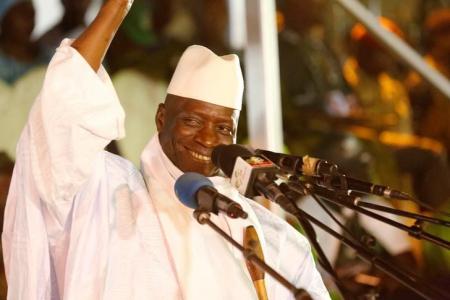
By Pap Saine
BANJUL (Reuters) – Gambia’s leader Yahya Jammeh said he was stepping down on Saturday under pressure from West African armies which entered the country this week following his refusal to concede an election defeat to President Adama Barrow.
Jammeh’s announcement in an overnight broadcast on state television appears to bring to an end a political impasse and brings to a close a reign that began in 1994 when he seized power in a coup.
In practice, he had little choice but to step down after some 7,000 soldiers from Nigeria and Senegal entered Gambia on Thursday backed by tanks and warplanes. They were poised to move into the capital as Jammeh’s army provided no resistance.
Jammeh’s authoritarian government established a reputation for torturing and killing perceived opponents to stifle dissent and his departure will likely be welcomed by democracy advocates and viewed as a triumph for African diplomacy.
“I have decided today in good conscience to relinquish the mantle of leadership of this great nation,” Jammeh, dressed in a white robe and looking tired, said.
“All those who have supported me or were against me in this period, I implore them to put the supreme interest of our nation the Gambia above all partisan interest and endeavour to work together as one nation,” he added.
Jammeh made no mention of whether he would go into exile but said he was leaving power in the national interest and was grateful there was no bloodshed during the political stalemate.
His announcement was delayed by negotiations with the presidents of Guinea and Mauritania over where he would live and whether he could be offered amnesty for alleged crimes committed during his years in power, said sources close to talks. They said the outcome of the talks remained uncertain.
Shops in central Banjul were shut and the streets quiet on Saturday, with a dozen people gathered outside State House.
“How can we believe anything until we see he has left,” Chino Hussein, 21, a security guard, said.
Jammeh’s defeat in December sparked celebrations on the streets of Banjul but, after initially conceding defeat, he backtracked and said he would challenge the result in court.
In a last bid to cling to power this week, he declared a state of emergency, dissolved the cabinet and the National Assembly extended his term for three months. More than half the government resigned and 45,000 people fled to Senegal.
‘RULE OF FEAR’ BANISHED
Barrow, 51, is a soft-spoken man who worked as a property developer and led an opposition coalition few thought would win.
He was sworn in at the Gambian embassy in Senegal on Thursday and immediately called for international support.
“The rule of fear has been banished from Gambia for good,” Barrow told a crowd at a Dakar hotel on Friday, once it became clear a deal had been struck for Jammeh to relinquish power.
“To all of you forced by political circumstances to flee our country, you now have the liberty to return home,” he said. Barrow was also expected to return to the country.
The crisis was a test for regional bloc ECOWAS, not least because Jammeh had held office longer than any other current president in the grouping of states. The African Union and U.N. Security Council supported the military intervention.
Guinea’s President Alpha Conde and Mauritania’s President Mohamed Ould Abdel Aziz went to Banjul on Friday.
“The accord sees the departure of Jammeh from Gambia for an African country with guarantees for his family, those close to him and himself. He can come back to the country as he pleases,” Aziz was quoted as saying by the Mauritanian state news agency.
Gambia’s Atlantic beaches make it a holiday destination for Europeans. Tourism is a mainstay in the country of 1.8 million and the economy is otherwise reliant on peanut production and remittances from overseas.
The economy is expected to grow 4.5 percent in 2017, bouncing from a projected contraction of 4.0 percent last year, according to World Bank figures.
(Additional reporting by Tim Cocks in Banjul and Emma Farge in Dakar; Writing by Matthew Mpoke Bigg; Editing by Alexander Smith)